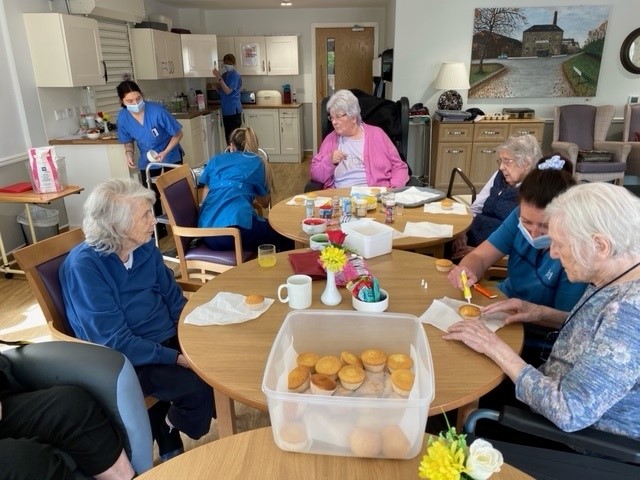What to Consider When Choosing a Care Home

Choosing a care home for yourself or a loved one can be an emotional and overwhelming decision for everyone involved. It's not always easy to accept that someone may no longer be able to live independently with older age. Choosing the most appropriate care home can greatly affect the quality of life and overall well-being of a loved one.
With so many options available in the UK, it's important to know what factors there are to consider before making a decision such as moving to a care home. In this blog, we will share some insights and tips on what to consider when choosing a care home, to help you make an informed decision that best fits a person’s needs and preferences. Whether you are a senior looking to find a care home or a family member helping a loved one, the care home staff will be on hand to support you every step of the way.

The Essentials to Look for When Moving Into a Care Home
Each care home is unique and has its own key values, so when looking to move into a care home, you would need to find out whether their values match your expectations. There may be multiple care homes that at a first glance seem appealing, however, it is important to do your research and tour the care home in order to get a true feel for the atmosphere. The below considerations are what you should add to your care home checklist:
The Facilities and Social Opportunities Available
Understanding what care types a care home offers is important, as well as their choice of social activities. Most care homes will be equipped with a range of facilities and amenities for residents to enjoy a fulfilling lifestyle. These facilities should reflect the residents’ interests and hobbies, to provide them with the opportunity to live a full and enriched life. Some care homes are all-inclusive, meaning the care services, facilities and activities are all included in the price, and for others, extras may incur additional fees.
One common activity offered within a care home is a varied activities programme. An assigned Activities Coordinator will go above and beyond to produce a weekly schedule full of activities and events to stimulate residents. Examples of activities include local excursions where residents can go out and get involved with the local community, with some care homes having on-site transport to take them to and from destinations. Other facilities offered within a care home can include a hair salon, private secure gardens and arts & crafts workshops.
The Care Inspectorate & Its Inspection Report
The Care Inspectorate is a regulatory body that ensures care homes in Scotland meet the required standards of care and support for their residents. All of the information is public so anyone can look at the inspection report of a care home. They inspect care homes on a regular basis and create reports that provide a detailed overview of the home's services and quality of care.
Reading an inspection report can provide someone with a good idea of what to expect from the care home. It covers a range of topics such as the quality of care, the home's cleanliness, the staff's training and qualifications, the food provided, and the overall atmosphere of the home. These reports are publicly available and can be accessed online, so it's easy to see what rating a care home has been given and what areas they need to improve on. If the care home is located in England, it will be referred to as the Care Quality Commission (CQC).
Care Types Offered
Whilst no two care homes are the same and each offers its own variations of care types, the most common care types provided are Residential, Dementia, Nursing and Respite Care.
Respite Care
Respite care is a short-term care option that provides relief to caregivers who are responsible for caring for a loved one on a full-time basis. It can be challenging to balance the demands of caregiving with other responsibilities, and respite care offers a much-needed break for everyone. Respite care can last for a few weeks or a few months. During this time, the person receiving care can take part in activities and receive 24-hour support from trained professionals. Respite care is also suitable for those who have recently been discharged from the hospital or had an injury that requires time out from their daily routine.
Residential Care
Residential care is a long-term care service provided to older adults who require assistance with daily living activities but do not yet require nursing care. Residents can live in a group setting while receiving care and support from trained health and social care professionals at any time of the day or night. Residential care homes offer residents with a variety of all-inclusive services including meals, housekeeping, and laundry services, as well as social and recreational activities to ensure that residents have an enjoyable and comfortable living experience.
Dementia Care
Dementia Care is a specialised type of care that is designed to provide support and assistance to those living with dementia. Dementia is a progressive condition that affects a person's ability to think rationally, remember recent events, and communicate with others. It can be a challenging condition to live with, not only for the person affected but also for their family members and caregivers. Dementia Care is focused on providing a compassionate and empathetic approach to personalised care and support to help those living with dementia maintain their independence, dignity, and quality of life for as long as possible.
Nursing Care
Nursing care is a type of care that is provided by trained nurses who offer 24-hour support to individuals who require medical assistance and personal care. This type of care is usually provided to individuals who have complex medical needs, such as those with long-term health conditions, physical disabilities, and those in need of palliative care. The aim of nursing care is to provide personalised care to ensure that an individual's health and well-being needs are met in a safe and supportive environment. The levels of care each individual requires will differ, so care homes will carry out care needs assessments prior to admission which will outline a resident’s care approach.
Accessibility of the Care Home and Its Location
When choosing a care home or nursing home, another important factor to consider is accessibility and location. You’ll need to choose a facility that is easily accessible to family and friends who may want to visit a care home, and that is located in a convenient area for the person receiving care. The location should be considered based on the individual's needs, preferences, and interests. For example, if the person enjoys going for walks or being outdoors, it may be wise to choose a care home located near parks or other green spaces.
You’ll need to consider how easy it is to get to a care home for loved ones that would like to visit regularly. If an individual has mobility issues, you’ll need to find out if a care home has wheelchair access and facilities that can accommodate their needs. A care home that is located within a tight-knit community and has local amenities such as shops, cafes, and community centres can provide opportunities for social interaction and engagement for older people.



Enjoy a Better Way of Life at Haddington Care Home
Haddington Care Home is an all-inclusive care home situated in the picturesque town of Haddington in East Lothian, offering high-quality comprehensive residential, dementia, nursing and respite care 24 hours a day, 7 days a week. We provide residents with the opportunity to enjoy a better way of life where they can take advantage of our beautiful facilities and amenities whenever they wish.
Our expert team is on hand to provide exceptional care and support for residents to live a rich and meaningful life in a warm and supportive environment at our luxury care home in Haddington. Our in-house facilities include dining rooms, private gardens, a hair salon, and a varied activities programme for an active lifestyle. We are located in an accessible area of Haddington, where residents can visit local cafes, gardens and shops and attractions within the local community.
Talk to a Member of Our Team
Our warm and welcoming staff are more than happy to discuss any queries you may have regarding life at Haddington Care Home, the local area or any of the services we provide. You can contact us by calling 01620 674880 or emailing info@haddingtoncarehome.co.uk, we look forward to hearing from you.





